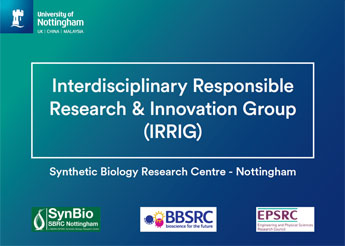Responsible Research and Innovation
What is RRI?
Responsible Research and Innovation (RRI) is concerned with the nature and trajectory of research and innovation: what it can do for society and who gets to decide. According to Research Councils UK, it is:
“the process that helps researchers understand the benefits and risks of emerging technologies early on in the innovation process. It includes public engagement, risk management, life cycle analysis, ethical approval and regulation”.
AREA
RRI has been embedded by research funding institutions such as the EPSRC (Engineering and Physical Sciences Research Council), the BBSRC (Biotechnology and Biological Sciences Research Council), the European Commission’s Horizon 2020 programme and in major funding calls from other organisations. The EPSRC has RRI as a key strategic element of its funding programme, highlighting four important dimensions of RRI, namely AREA:
- (A)nticipate
Describing and analysing the impacts, intended or otherwise, (e.g. economic, social, environmental) that might arise. This does not seek to predict but rather to support an exploration of possible impacts and implications that may otherwise remain uncovered and little discussed.
- (R)eflect
Reflecting on the purposes of, motivations for and potential implications of the research, and the associated uncertainties, areas of ignorance, assumptions, framings, questions, dilemmas and social transformations these may bring.
- (E)ngage
Opening up such visions, impacts and questioning to broader deliberation, dialogue, engagement and debate in an inclusive way.
- (A)ct
Using these processes to influence the direction and trajectory of the research and innovation process itself.
The application of RRI also applies to the potential commercialisation of products and innovations based on synthetic biology, as stressed by the Technology Strategy Board (now Innovate UK). The focus here is not only on identifying, anticipating and responding to potential risks and impacts but also having procedures in place to manage them.
Interdisciplinary Responsible Research and Innovation Group (IRRIG)
The SBRC is committed to implementing Responsible Research and Innovation (RRI) within its research programme. The RRI strand of the SBRC’s research programme takes a collaborative interdisciplinary approach, with social scientists working closely with the scientists and PhD students in the Centre to explore social, political and ethical issues relating to their work.
To that end, the SBRC’s Interdisciplinary Responsible Research and Innovation Group (IRRIG) was established in 2018. IRRIG undertakes an embedded programme of RRI and social science research in close collaboration with other members of the SBRC, engaging with scientists, stakeholders and publics around RRI and critically studying how RRI works in theory and practice.

Background
From July 2014 to October 2016, the RRI strand of the SBRC’s research programme was led by Brigitte Nerlich (Emeritus Professor of Science, Language and Society) and she continues to contribute to the SBRC as a Management Board Member of The Carbon Recycling Network. Dr Carmen McLeod, a social anthropologist, was appointed as a full-time Research Fellow to the RRI strand from June 2015 to June 2017, and she subsequently led IRRIG from April 2018 until January 2020. Dr Eleanor Hadley Kershaw, a science and technology studies researcher, joined IRRIG in November 2018 as Research Fellow on the ENGICOIN project. Since June 2020, Eleanor leads IRRIG as Senior Research Fellow, working in collaboration with colleagues across the SBRC and Professor Dimitris Papadopoulos (Director, Institute for Science and Society).